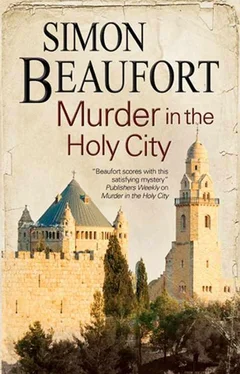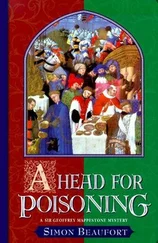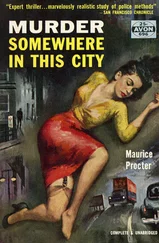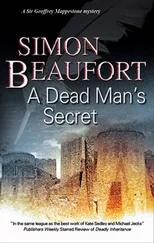Simon Beaufort - Murder in the Holy City
Здесь есть возможность читать онлайн «Simon Beaufort - Murder in the Holy City» весь текст электронной книги совершенно бесплатно (целиком полную версию без сокращений). В некоторых случаях можно слушать аудио, скачать через торрент в формате fb2 и присутствует краткое содержание. Год выпуска: 0101, Жанр: Исторический детектив, на английском языке. Описание произведения, (предисловие) а так же отзывы посетителей доступны на портале библиотеки ЛибКат.
- Название:Murder in the Holy City
- Автор:
- Жанр:
- Год:0101
- ISBN:нет данных
- Рейтинг книги:3 / 5. Голосов: 1
-
Избранное:Добавить в избранное
- Отзывы:
-
Ваша оценка:
- 60
- 1
- 2
- 3
- 4
- 5
Murder in the Holy City: краткое содержание, описание и аннотация
Предлагаем к чтению аннотацию, описание, краткое содержание или предисловие (зависит от того, что написал сам автор книги «Murder in the Holy City»). Если вы не нашли необходимую информацию о книге — напишите в комментариях, мы постараемся отыскать её.
Murder in the Holy City — читать онлайн бесплатно полную книгу (весь текст) целиком
Ниже представлен текст книги, разбитый по страницам. Система сохранения места последней прочитанной страницы, позволяет с удобством читать онлайн бесплатно книгу «Murder in the Holy City», без необходимости каждый раз заново искать на чём Вы остановились. Поставьте закладку, и сможете в любой момент перейти на страницу, на которой закончили чтение.
Интервал:
Закладка:
Courrances reined in next to him, narrowing his eyes at the distant black dots of Hugh’s army. “A hundred and twenty, I would say,” he said. He looked at Geoffrey’s men. “And we number perhaps fifty.” He looked back at Geoffrey, fixing him with his expressionless pale blue eyes, and spurred his horse after his Hospitallers.
“He is right,” said Roger. “This will be no well-matched battle, Geoff.”
“But Hugh does not know we are coming,” said Geoffrey. “We have the element of surprise.”
“Do not fool yourself,” said Roger. “He knows all right. He has left too many clues behind him for someone not to follow-if not you and me, then Courrances.”
Geoffrey did not answer, and he set off again as fast as he dared without destroying the horses. The main road went steadily west, heading for the ancient settlement of Latrun, before continuing northwest to Ramle and then on to Jaffa. Geoffrey knew this region well, having taken many scouting parties out to scour the desert for Saracen bandits, and he knew that by bearing farther north, he could cut in a straight line across the desert and rejoin the road at the tiny settlement of Ramle. Such a shortcut would serve the dual purpose of slicing several miles from their journey, and of masking their pursuit from Hugh and his men.
He yelled his plan to Roger, who grinned in savage delight. D’Aumale forced his way through the milling soldiers, his face tight with tension.
“If we cut directly across the desert, we might yet intercept Hugh,” Geoffrey explained.
“Then what are you waiting for?” yelled d’Aumale, spurring his horse off in entirely the wrong direction. Geoffrey and Roger exchanged amused glances before kicking their own mounts into action, and the chase was on once more.
The route across the desert was not as easy as that provided by the main road. It was rocky, and deeply scarred with great cracks caused as the land shrank away from the ferocity of the sun’s heat. The soldiers were forced to negotiate steep ravines caused by the winter and spring rains, when great sheets of water fell briefly on the dry land, only to run off it again in churning brown torrents that headed straight for the sea. But despite the rough terrain, they made good time and lost only two of their number due to lame horses. Geoffrey dispatched them back to the citadel to see if reinforcements might be raised. Geoffrey’s dog panted along with them, easily able to maintain the slower pace forced by crossing the open country.
There was a tiny spring, little more than a muddy puddle, that Geoffrey knew, about halfway along their route. He called a halt and ordered men and horses to drink-but sparingly, for he knew the horses would be unable to run with overfull stomachs. Then they were off again, refreshed, and ready for the gruelling second leg of their race across the furnace of the desert.
Geoffrey felt his face burn and his head pound as he became hotter and hotter. Beneath him, his horse began to wheeze from the dust, and the dog, still trotting at his side, had its tongue out so far it was almost scraping the ground. Another rider fell behind as his horse began to limp, and Geoffrey wondered whether, even if they did catch up with Hugh, they would be able to fight him. For fight Hugh would. The sardonic knight had no choice now but to follow the path he had taken to its bitter end. Even if he gave himself up, the Advocate would hang him as a traitor.
Geoffrey forced thought from his mind, and concentrated on guiding his horse around the great lumps of shattered rock that strewed the desert floor, and urging it to leap across the maze of ravines that gouged through the baked earth.
Eventually, after the sun had reached its zenith and was beginning to dip into late afternoon, they saw a thin line of green in the distance, and Geoffrey knew Ramle was in reach. The sun cast shadows across the desert that were growing steadily longer, and there would soon be very little daylight left. Geoffrey urged his men on with shouts of encouragement that made his voice hoarse. But they needed little urging, for they too had seen Ramle on the horizon and sensed battle was imminent.
A dry riverbed cut through the desert toward Ramle, and Geoffrey led his men down into it. The bed was relatively smooth, and so they were able to pick up speed. And there were banks on either side that would shield them from sight, so that Hugh would not see them coming. As they drew nearer to the trees, Geoffrey raised his hand to bring the main body to a halt, and while he and the knights continued to advance at a more sedate pace. Who knew what precautions Hugh might have taken, and the last thing Geoffrey needed was to ride headlong into an ambush. D’Aumale began to speak, but Geoffrey silenced him with a glare, and the gentle pad of hooves and the occasional clink of metal were the only sounds as they rode forward.
They reached the flat-roofed houses on the outskirts of Ramle, which had been their target. The villagers, seeing the advance of heavily armed knights, had already fled into the desert, abandoning homes, belongings, and livestock. Geoffrey saw several of the men take acquisitive looks at the houses, and knew he would be hard-pressed to prevent them from looting later. Not that there would be much to take, for the houses were poor and the livestock scrawny. Even Geoffrey’s dog, infamous killer of the citadel chickens and goats, appeared uninterested and slunk away to find somewhere shady to recover from its exertions.
An old woman, too frail to run with the others, watched their approach with a mixture of resignation and fear. She saw Geoffrey looking at her, and pulled a thin, black shawl tighter around her shoulders, as if she imagined it might protect her from him.
“Greetings, mother!” he called in Arabic. “We mean no harm to you.”
She gaped at him, startled by the curious notion of a Crusader knight speaking her own tongue, albeit falteringly.
“Can you tell me how long it has been since the other soldiers passed this way?”
She recovered herself and came toward him, her toothless jaws working in time with her doddering footsteps.
“No soldiers have passed this way today,” she said when she reached him.
Geoffrey’s hopes soared. “No group of horsemen? More than a hundred of them?”
She shook her head. “No.” She gestured to where the road wound through the grove of olive trees, toward the main settlement of Ramle and then on through the desert to Jaffa and the sea. “You would still see the dust if they had passed recently.”
Geoffrey saw that was probably true. So they were ahead of Hugh! The fair-haired knight and his retinue of traitors must have been making slower time than Geoffrey had imagined, perhaps considering that no force large enough to confront them could be raised so quickly. So now, despite his inferior numbers, Geoffrey had the advantage.
“Thank you, mother. These other men will pass soon and there may be fighting, so one of my soldiers will take you out of harm’s way.”
Quickly, he translated the news to the others. He dispatched Helbye as lookout and began setting up an ambush. Barlow was charged with carrying the old woman away from the village to the shade of the olive grove, much to Courrances’s amazement.
“She is an infidel! We need Barlow here.”
“She is an infidel who has just given us the powerful weapon of surprise,” retorted Geoffrey. “Without her information, we would now be riding to Jaffa with Hugh behind us. Then he would have surprised us. Besides, what I do with my men is none of your business.”
Courrances bit back the reply he would dearly have loved to make, and went to help d’Aumale. Geoffrey’s plan was simple. The road through the houses was narrow, like a gully. When the first of Hugh’s men was almost through the village, Barlow, wrapped in the old woman’s shawl, would drive goats across the road at a prearranged signal from Helbye, who was watching the road from a tree. When Hugh’s soldiers slowed to avoid the blockage, a group led by Roger would attack the rear of the column. As Hugh’s men turned to deal with this, a second unit led by Geoffrey would attack the front. And in all the confusion, Courrances, d’Aumale, and the Hospitallers would harry the middle section trapped in the narrow road, with the aid of Geoffrey’s archers.
Читать дальшеИнтервал:
Закладка:
Похожие книги на «Murder in the Holy City»
Представляем Вашему вниманию похожие книги на «Murder in the Holy City» списком для выбора. Мы отобрали схожую по названию и смыслу литературу в надежде предоставить читателям больше вариантов отыскать новые, интересные, ещё непрочитанные произведения.
Обсуждение, отзывы о книге «Murder in the Holy City» и просто собственные мнения читателей. Оставьте ваши комментарии, напишите, что Вы думаете о произведении, его смысле или главных героях. Укажите что конкретно понравилось, а что нет, и почему Вы так считаете.












